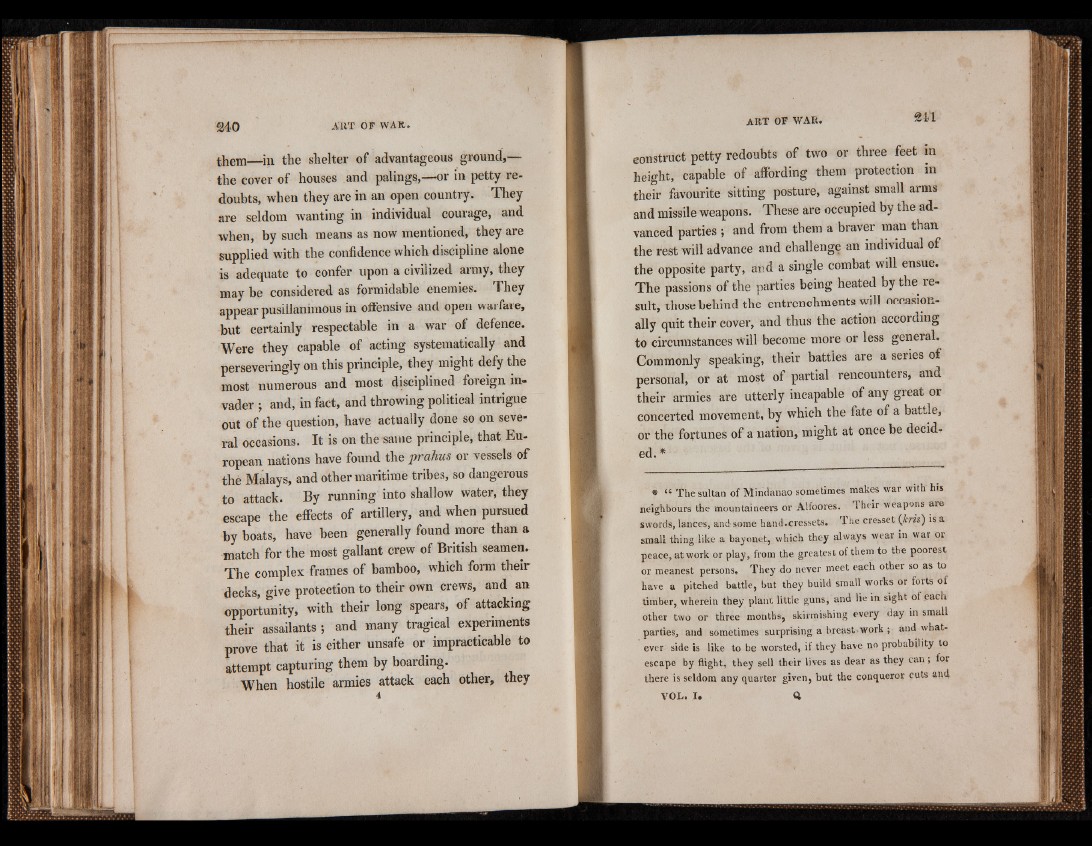
them—in the shelter of advantageous ground,—
the cover of houses and palings,—or in petty redoubts,
when they are in an open country. They
are seldom wanting in individual courage, and
when, by such means as now mentioned, they are
supplied with the confidence which discipline alone
is adequate to confer upon a civilized army, they
may be considered as formidable enemies. They
appear pusillanimous in offensive and open warfare,
but certainly respectable in a war of defence.
Were they capable of acting systematically and
perseveringly on this principle, they might defy the
most numerous and most disciplined foreign invader
; and, in fact, and throwing political intrigue
out of the question, have actually done so on several
occasions. It is on the same principle, that European
nations have found the prahus or vessels of
thè Malays, and other maritime tribes, so dangerous
to attack. By running into shallow water, they
escape the effects of artillery, and when pursued
by boats, have been generally found more than a
match for the most gallant crew of British seamen.
The complex frames of bamboo, which form their
decks, give protection to their own crews, and an
opportunity, with their long spears, of attacking
their assailants ; and many tragical experiments
prove that it is either unsafe or impracticable to
attempt capturing them by boarding.
When hostile armies attack each other, they
eonstruct petty redoubts of two or three feet in
height, capable of affording them protection in
their favourite sitting posture, against small arms
and missile weapons. These are occupied by the advanced
parties ; and from them a braver man than
the rest will advance and challenge an individual of
the opposite party, and a single combat will ensue.
The passions of the parties being heated by the result,
those behind the entrenchments will occasionally
quit their cover, and thus the action according
to circumstances will become more or less general.
Commonly speaking, their battles are a series of
personal, or at most of partial rencounters, and
their armies are utterly incapable of any great or
concerted movement, by which the fate of a battle,
or the fortunes of a nation, might at once be decided.
*
* I The sultan of Mindanao sometimes makes war with his
neighbours the mountaineers or Alfoores. 1 heir weapons are
swords, lances, and some hand-cressets. The cresset (Jens') is a
small thing like a bayonet, which they always wear in war or
peace, at work or play, from the greatest of them to the poorest
or meanest persons. They do never meet each other so as to
have a pitched battle, but they build small works or forts of
timber, wherein they plant little guns, and lie in sight of each,
other two or three months, skirmishing every day in small
parties, and sometimes s u r p r i s i n g a breast.work ; and whatever
side is like to be worsted, if they have no probability to
escape by flight, they sell their lives as dear as they can, for
there is seldom any quarter given, but the conqueror cuts aqd
VOL. I . Q